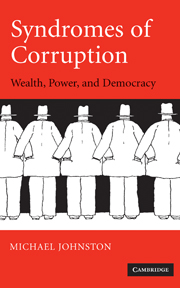Book contents
- Frontmatter
- Contents
- List of figures
- List of tables
- Preface
- 1 Wealth, power, and corruption
- 2 The international setting: power, consensus, and policy
- 3 Participation, institutions, and syndromes of corruption
- 4 Influence Markets: influence for rent, decisions for sale
- 5 Elite Cartels: how to buy friends and govern people
- 6 Oligarchs and Clans: we are family – and you're not
- 7 Official Moguls: reach out and squeeze someone
- 8 From analysis to reform
- Appendix A Countries in each cluster and distances from statistical cluster centers
- Appendix B Statistical indicators for country clusters
- References
- Index
5 - Elite Cartels: how to buy friends and govern people
Published online by Cambridge University Press: 22 September 2009
- Frontmatter
- Contents
- List of figures
- List of tables
- Preface
- 1 Wealth, power, and corruption
- 2 The international setting: power, consensus, and policy
- 3 Participation, institutions, and syndromes of corruption
- 4 Influence Markets: influence for rent, decisions for sale
- 5 Elite Cartels: how to buy friends and govern people
- 6 Oligarchs and Clans: we are family – and you're not
- 7 Official Moguls: reach out and squeeze someone
- 8 From analysis to reform
- Appendix A Countries in each cluster and distances from statistical cluster centers
- Appendix B Statistical indicators for country clusters
- References
- Index
Summary
Introduction
Sometimes corruption is less a matter of influence than of control. Where interlocking groups of top politicians, business figures, bureaucrats, military and ethnic leaders share corrupt benefits among themselves they can build networks and alliances that solidify their power and stave off the opposition. Corruption of this sort may well be highly lucrative, but it is also a strategy for forestalling political change.
These Elite Cartel practices may outwardly resemble Influence Markets: money and favors change hands, with benefits flowing to favored people and businesses. Most societies involved are relatively stable, middle-income or affluent democracies, or are well along in the consolidation process. Perceived levels of corruption, while higher than in Influence Market societies, remain lower than in Oligarchs and Clans, or Official Moguls, cases. Civil society and for accountability, while weaker than in Influence Market societies, are far from negligible.
But differences become apparent at the level of Elite Cartel countries' institutions. Political regimes have been in place for shorter periods of time, and institutions are weaker, than those of Influence Market societies. Inequality is more pronounced, and economies are more dependent upon primary exports, and thus upon global commodity markets. Leaders in these societies face political competition that is growing faster, is less institutionalized, and is thus comparatively unpredictable. Judiciaries are weak and often compromised, making contracts more difficult to enforce and property rights harder to protect.
- Type
- Chapter
- Information
- Syndromes of CorruptionWealth, Power, and Democracy, pp. 89 - 119Publisher: Cambridge University PressPrint publication year: 2005



